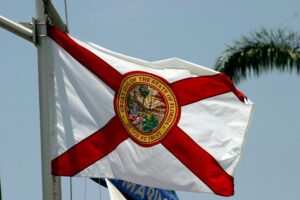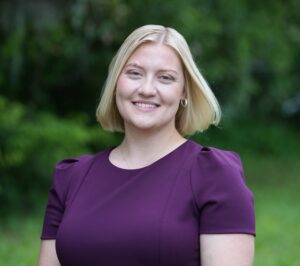Weaponized Humanism: Stories from the Campaign Trail in Florida

I’ve been a Democrat as long as I’ve been an atheist—since I could think for myself and begin to develop the moral compass that led me to find myself in Tallahassee, Florida in April 2022, filing to run for the Florida House of Representatives.
I grew up in southern Indiana, the only Democrat and the only atheist I knew—so I’ve been passionate about standing up for the underdog for a while. And being a Democrat in Florida is certainly running as an underdog. When I moved to the Sunshine State, I immediately jumped into local politics, eventually serving as the President of the Young Democrats of Seminole County. And as a volunteer for a local State Senate campaign and for President Joe Biden’s 2020 election, I learned so much about our community and fell even more in love with my adopted hometown. A couple of years into my time here in central Florida, the team at the Florida House Democratic Campaign Committee reached out to ask me to consider running for office against an incumbent Republican state representative.
I am incredibly proud of the campaign I ran in 2022 and again in 2024, in part because it highlighted that other uncommon thing about me—I’m an atheist. That’s not a popular position in regional Florida politics. So my political advocacy came head to head with the work I did during my time as the spokesperson at the American Humanist Association—work that I’m also incredibly proud of. I knew from the moment I was asked to run for office by the Executive Director of the Florida House Democratic Campaign Committee that being nonreligious would be a part of the conversation. I shared it with my team immediately, knowing that atheists are perceived as one of the least-trusted and most-hated religious groups—especially in politics!
While I was proud of the campaign my team and I put together in 2022, it was very much a first-time campaign. Working in nonprofits taught me how to ask people for money, but the difference between “give to a mission we both believe in” and “give to me” is stark when you’re the one making the calls. I learned from scratch how to share my vision for our community in thirty seconds or less and how to change from a sweaty campaign t-shirt after door-to-door canvassing to a blouse and blazer in the back of a Ford Escape for a community forum. For the most part, the Republican establishment didn’t take our campaign seriously in my first campaign. In fact, the first handful of attack mailers against me spelled my name wrong!
With a month to go until Election Day, the opposition research finally got serious and we saw the first series of attack mailers focused on my work at the American Humanist Association. Rather than focusing on my personal religious identity, these mailers quoted my interview with Laura Ingraham during the Bladensburg cross Supreme Court litigation and painted me as anti-Christian and anti-cross. Because these mailers came late in the game, we hadn’t done significant polling on my religious identity and don’t believe that they made a significant impact on voters. With vote-by-mail ballots already out and early voting underway, most voters had already made up their minds. I lost the 2022 election by about 3,000 votes after being outspent by at least 3:1. But these attacks set the tone for the negative components of the conversation in the next election cycle.

Sarah Henry
From the minute I made the decision to run again, everything about the 2024 campaign was a step-up, in both professionalism and intensity, from 2022. Given my strong showing in 2022 I was able to quickly restart my campaign for 2024—I filed a full year earlier before Election Day! We hired a campaign manager earlier, raised enough money to build out a larger support team, including paid interns who saved the day more than once, and we sent more mail and showed up on television earlier. But no matter how many hours each day I spent fundraising, the Republicans always had more money. They outspent us on mail—starting to send attack pieces more than six months before Election Day. And they outspent us on television, with visions of my face surrounded in flames popping up during every break of critical college football games. We also prepared for the inevitable attacks on my faith—or lack thereof. Our polling indicated that while highlighting my religious identity did increase vitriol from men who were already opposed to my candidacy, it wasn’t effective in persuading new voters. We can only assume that their polling was more positive in its reassurances that atheists were reviled by the average voter. Mailers accused me of hating Donald Trump and Mike Pompeo for being Christian Nationalists (true) and of believing that Christians are not qualified for public service (false). The images in mailboxes and on television included my face in flames, one of my canvassing pictures superimposed on a pentagram, a raven sitting on my shoulder, and more anti-atheist tropes.
It was scary, and it was sad, and it was incredibly hard to get through, as my dad and over half a million strangers were exposed to millions of dollars in attacks on my personal character. Faith is so personal, and there’s nothing impersonal about your individual choices being plastered on virtual billboards for the world to see. Every moment that I thought I was alone in high school, when I was the only person I know who didn’t moan about youth group on Wednesdays, every sleepover that was a secret attempt to take me to church—I relived those moments as the local Republican party announced—over and over again—that atheists aren’t moral enough to be trusted as public servants, that nonreligious Americans can’t hold consistent values, that all humanists hate all Christians.
When you are standing in front of a polling place with voters yelling cheers or vitriol through their car windows, those feelings can be nearly overwhelming. Election Day simultaneously feels like it will end in thirty seconds and be interminable. But 7:00 pm EST on the first Tuesday in November does eventually come. The television commercials end, voters stop getting five pieces of mail a day, and everyone returns to their lives. And when polls closed, I lost by just 670 votes. A much better result than my 2022 campaign and a sign that the atheist attack ads were not as effective as my opponent hoped they would be.
As the campaign came to a close, I was getting recognized pretty frequently. I was always wearing my Sarah Henry for State House shirt, and the bright purple was eye-catching enough to draw the attention of fellow Publix shoppers or folks at my favorite local brewery. Between both campaigns, the average voter in Seminole County was seeing my face four or five times a day, on television and in their mailbox, so it’s no shock that I got both positive and negative comments while I waited in line to buy even more Gatorade and granola bars. I worried that the negative attacks would remain in peoples’ heads after Election Day, but most voters forget their down-ballot candidates pretty quickly. Now, a couple of months on, a cashier or postal worker may have a flicker of recognition when I hand over my ID, but the harassment has stopped. The anger of the average voter has faded and the focus has shifted, once again, to national politics.
I talk to a lot of people who are considering running for office, and I tell them all the same thing. Think about the worst thing you’ve done or your most controversial moment, the thing that you’re scared to tell new partners or your therapist, and assume that the other side knows about it and will slap it on TV. And ask yourself if you’re prepared for the world to know about your worst moment.
But I also tell them something else. Every single day of both campaigns, when I rested my head on the pillow, I never had to ask myself if I had done enough to stand up for what I believe. Every single day, I went into my community and asked my neighbors to care about each other, to love each other enough to vote for a better future. And while I’m not writing this from Tallahassee, I am confident that my team and I spread this message across Florida’s House District 38.
For me, it turns out that worst thing is something that is so important to me that I also made it my career—nonreligious Americans deserve a place in the national conversation. I urge you to make sure your voice is heard by expanding your engagement in your community and in the electoral arena.
